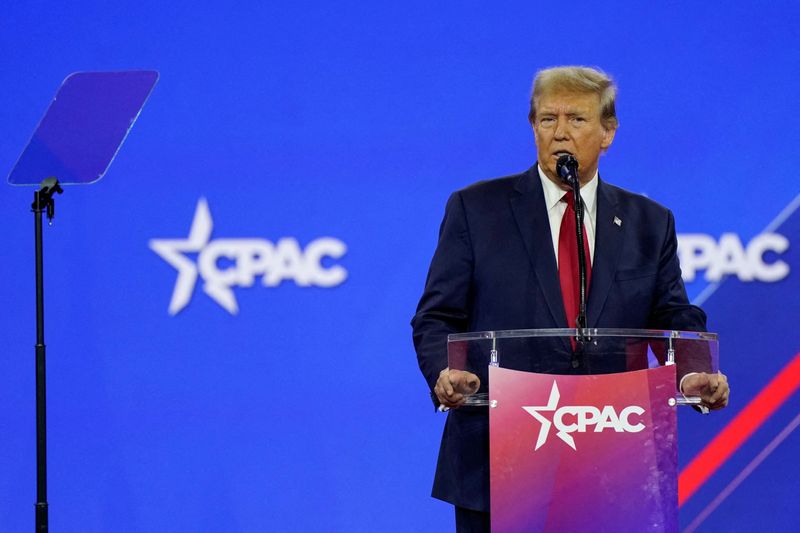Trump wins Michigan, Missouri, Idaho caucuses in dominant show of force

FILE PHOTO: Former U.S. President and Republican presidential candidate Donald Trump addresses the Conservative Political Action Conference (CPAC) annual meeting in National Harbor, Maryland, U.S., February 24, 2024. REUTERS/Elizabeth Frantz/File Photo
By Nathan Layne
GRAND RAPIDS, Michigan (Reuters) -Donald Trump on Saturday easily won the Republican caucuses in Michigan, where the party has been riven by infighting that some Republicans fear could hurt his campaign in the key battleground state as he gears up for the general election in November.
The former U.S. president also won the Missouri and Idaho Republican caucuses on Saturday, according to Edison Research.
In all three states Trump trounced Nikki Haley, his last remaining rival for the Republican presidential nomination, moving him closer to becoming his party’s White House standard-bearer and a likely general election rematch with President Joe Biden, a Democrat.
In Michigan, Trump beat Haley in all 13 districts taking part in the nominating caucuses, according to the state Republican Party.
Overall, Trump won with nearly 98% percent support: 1,575 votes to just 36 for Haley.
Pete Hoekstra, the Michigan Republican Party’s chair, called it an “overwhelming, dominating victory.”
More than 1,600 party insiders participated in the presidential caucus in the western Michigan city of Grand Rapids, where they were choosing delegates for Trump or former U.N. Ambassador Haley for the party’s national nominating convention in July.
Haley is fast running out of time to alter the course of the Republican nominating race. Next up is Super Tuesday on March 5, the biggest day in the primaries, when 15 states and one territory will vote.
With victories in Iowa, New Hampshire, Nevada, the U.S. Virgin Islands, South Carolina, and now Michigan, Missouri and Idaho under his belt, Trump is far and away the frontrunner in the race, with Haley hanging on thanks to support from donors keen for an alternative to the former president.
For this election cycle, Michigan Republicans devised a hybrid nominating system, split between a primary and a caucus.
Trump won the primary convincingly on Tuesday, securing 12 of 16 delegates up for grabs. He took all of Michigan’s remaining 39 delegates at stake on Saturday.
At one of the 13 caucus meetings, the participants – knowing Trump would win easily – decided to save time by simply asking anyone who backed Haley to stand up. In a room of 185 voting delegates, 25-year-old Carter Houtman was the only person who rose to his feet.
“It was a little lonely,” Houtman told Reuters in an interview afterward.
Houtman said he would likely vote for Trump in November’s general election if he is the nominee but felt it was important to stand up for his beliefs on Saturday.
“I didn’t like the way that Trump handled himself after the last election,” Houtman said.
Dennis Milosch, 87, a Trump supporter, said the former president’s dominating win on Saturday underscored how the party has been transformed from one aligned with big business to one focused on the working class.
“Wherever he goes, whatever he does, he pays attention to, responds to, the average person,” Milosch said.
RIFT IN MICHIGAN PARTY
The contest in Michigan on Saturday had held the potential for confusion. Internal turmoil has been percolating in the party for months, pitting backers of Michigan’s former Republican Party chair, Kristina Karamo, against the faction of party members who voted to oust her on Jan. 6, and installed Hoekstra as chair.
Hoekstra, whom Trump backed as chair, was overseeing the convention in Grand Rapids. Karamo had been planning to chair a dueling convention in Detroit on Saturday, but that was canceled after a Michigan court this week affirmed her ouster and an appeals court denied her request to stay the ruling.
Pro-Karamo party chairs for at least two districts held caucus meetings in separate locations from Grand Rapids in protest. However, the results from those are unlikely to be accepted by the Republican National Committee, which last month formally recognized Hoekstra as state party chair.
Hoekstra was the U.S. ambassador to the Netherlands during Trump’s presidency. Speaking to Reuters on the sidelines of the caucus meetings, he said he was confident the Michigan Republican Party would unite around the objectives of winning the White House and a U.S. Senate seat up for grabs and retaking the state House of Representatives.
“There is not a philosophical divide or an issue divide,” Hoekstra said. “This is about getting the party ready to win in November. … The focus is on beating Joe Biden.”
Trump’s victories in Missouri and Idaho netted him 54 and 32 delegates respectively.








